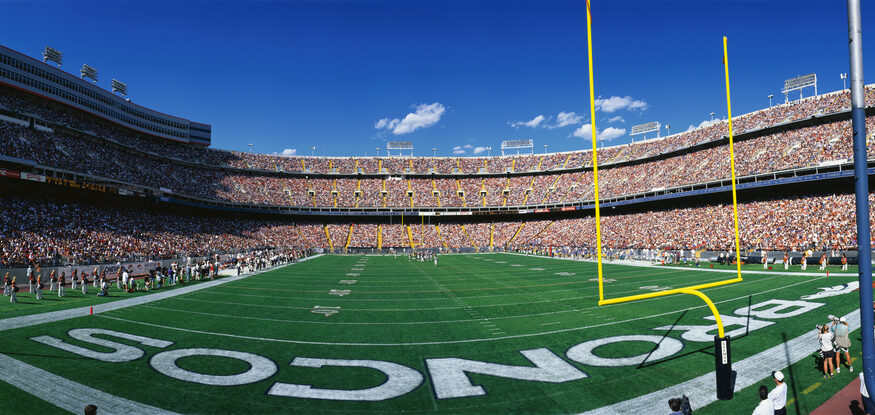SportsBiz: Sports and the Modern Fan
Technological, economic and behavioral trends that are affecting teams, leagues and fans
Stewart Schley //October 13, 2017//


SportsBiz: Sports and the Modern Fan
Technological, economic and behavioral trends that are affecting teams, leagues and fans
Stewart Schley //October 13, 2017//

The sports business is a-changing, sports fan. Consulting firm Deloitte just published its annual industry trends report, and as usual, it’s chock-a-block with solid stuff about the technological, economic and behavioral trends that are affecting teams, leagues and fans. Here’s a summary of what Deloitte sees happening globally in the sports marketplace, along with some hometown takes about how these same forces are making their way into the Colorado sports world.
ANALYZE THIS: Deloitte sees big-data analytics as a revolutionary force in sports, affecting everything from the way fans are targeted for ticket and merchandising sales to the way defenders station themselves on the field.
HOMETOWN TAKE: Under General Manager Jeff Bridich, the Rockies have taken the analytics plunge, moving from a “show-me” posture to an all-in embrace. A 2015 analysis by ESPN The Magazine declared the Rockies and five other Major League Baseball teams to be “skeptics,” that hadn’t kept up with category leaders like the Red Sox and Cubs. Since, the team has joined the realm of believers, led by predictive analytics expert Trevor Patch. He oversees a team that pores over data compiled from odd-sounding statistical databases like Trackman, PITCH f/x, HIT f/x and Statcast. One tangible example of their work: The Rockies frequently employ defensive shifts that station defenders in non-traditional spots to take advantage of hitter tendencies.
OPTIMIZING GAME DAY: Almost everybody’s got a high-definition TV set, a comfortable couch and a speed-dial listing for the nearest hot wings delivery joint. That makes it harder than ever to get fans to the stadium for in-person game day experiences. Deloitte points out a grab-bag of stadium improvements hasn’t done much to bring fans in:
“The short-term success of those now fairly commonplace ventures — technological in-stadium enhancements, visitor loyalty programs and experiential personalization — has varied, and long-term effectiveness is, in many ways, yet to be determined,” Deloitte points out.
HOMETOWN TAKE: When we visited with Denver Broncos President Joe Ellis last September, he said he worries more than ever about electronic media sapping the allure from live game attendance. For our money, stadium venue improvements like better Wi-Fi connectivity and themed restaurants like Coors Field’s Rooftop only go so far. Instead, why not do what the Atlanta Falcons did last year: Reduce the cost of a hot dog or a soda to $2.
MEDIA DISRUPTION: Starting this NFL season, Amazon – the company that delivers everything from vacuum cleaner bags to TV sets – will televise NFL games on Thursday nights. That’s a clear indication we’re not in Kansas anymore, sports-media wise. As Deloitte points out, acceleration in alternative destinations for sports watching is threatening the old TV guard and giving teams and leagues reason to believe there’s a new generation of viewers and monetizable moments waiting to be captured.
HOMETOWN TAKE: The Rockies were part of a sports TV first on May 19, when a road game against the Cincinnati Reds inaugurated Facebook’s live coverage of MLB games. On the auto-racing circuit, Centennial-based Liberty Media Group acquired the Formula One racing business in January, giving John Malone’s company control of a sports content creator that hopes to gain value by parceling out rights across a growing digital media ecosystem. On a broader front, Colorado’s dominant cable company Comcast, along with the Littleton-based satellite TV rival Dish Network, have felt the same cord-cutting sting that has humbled cable networks like ESPN on a national level. The pay-TV industry overall is losing more subscribers than newer online alternatives are adding, meaning TV networks like ESPN reach fewer households than they used to.
ALTERING REALITY: The onset of virtual-reality technology, along with its cousin known as augmented reality (think Pokémon Go), have the potential to further disengage fans from the stadium experience as consumers become enraptured by immersive media experiences. But Deloitte sees promise in the sports arena, especially for augmented reality applications. “AR apps could customize venue signage for each user, tell fans where a friend is sitting, or overlay stats on players in a game.”
HOMETOWN TAKE: Not much to report on the local scene just yet. When virtual reality lets us pre-determine the outcome of an Avalanche shot-on-goal and then watch it happen before our eyes, we might be in.

























